If you are wondering why bugs and other pests pay your bathroom a visit, it’s because of all the moisture. And when we’re talking about the toilet seat, in particular, many people fail to clean it consistently and in detail. Flushing isn’t enough, since there is the residue left behind and that is enough to attract all the wrong guests.
Bright Side wants you to know that many pests can crawl into your house through your toilet and that there are ways to prevent this from happening.
1. Snakes
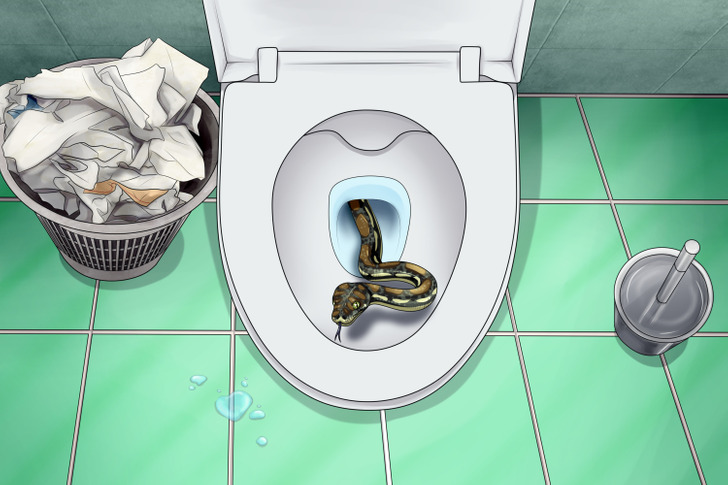
Snakes just love cool, wet, and dark places and that’s why your toilet pipes can be very intriguing to them. But, what drives them there in the first place is the sewer that has food remnants that they can feed on. When they are finished with their food in the sewer, they will look for a way out and the pipes are the easiest and quickest route. However, you shouldn’t be afraid if you live in a cold environment, since snakes will only sneak up in toilets in warm countries.
It’s usually harmless snakes that crawl through the pipes, like garden or tree snakes. That’s because these snakes are slimmer than venomous ones and can fit through the pipes. Although, some anacondas have appeared in people’s toilets in South America and Australia.
2. Rats
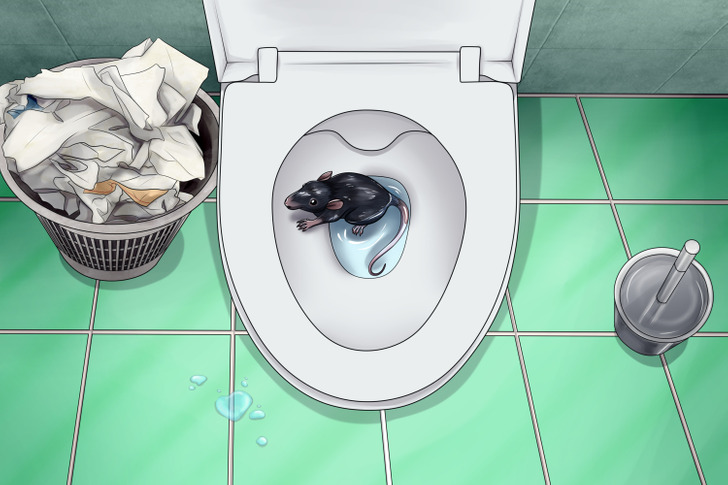
Like snakes, rats are also in constant pursuit of food and our pipes can be very appealing to them. In houses where the toilet and garbage disposal end up in the same pipes, rats are more likely to find a way in. And because their anatomy is very bendy, they can swim through the pipes and hold their breath for minutes before they need air.
So, it’s not just important to discard your food remnants in a trash bag but to also never flush food down the toilet. If there is no food in the pipes, rats won’t have any reason to try and enter your sewage system. You should also keep the toilet cover closed at all times and maybe install a rat guard. This allows water to exit the pipes whenever you flush, but nothing can come up in the opposite direction.
3. Spiders
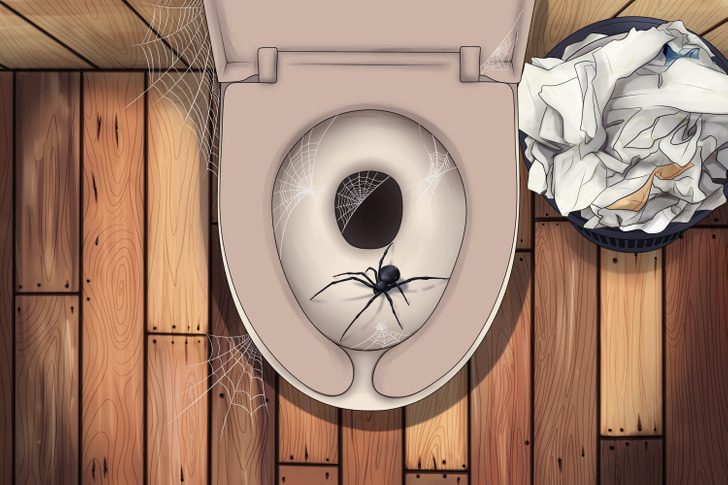
With spiders, things get a bit more complex, since they can’t swim in your pipes, but they can appear in your bathroom through another passage. And when they get in, they will probably sit outside the toilet seat. Only black widows will crawl inside the toilet and weave their web from side to side. But, that will happen only in an outdoor toilet that doesn’t have plumbing and that isn’t connected to a sewer system.
That’s where these venomous spiders thrive since there are many flies that they can catch for food. That’s also why you need to always check the seat thoroughly before using an outhouse toilet. Spiders, like the black widow, the brown recluse, and the hobo spider won’t have any trouble biting you.
4. Lizards
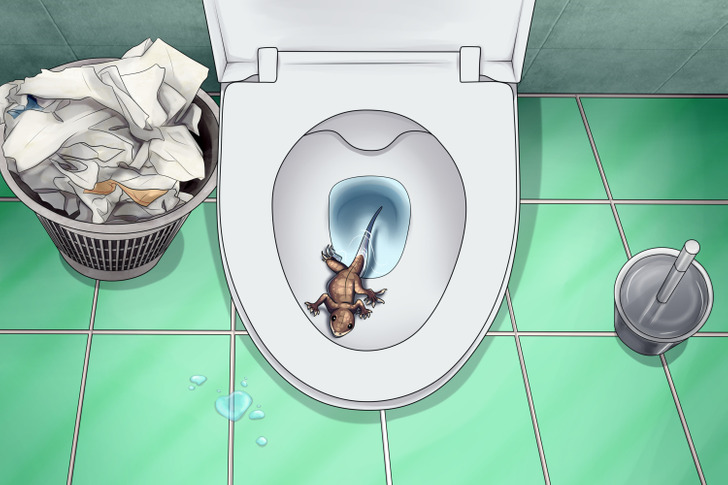
In the Southwest United States, lizards coming through the toilet pipes are a quite common occurrence. That’s because these creatures love water and they try to find food wherever they can. Crickets and other insects (like flies) can be found a lot in your toilet’s plumbing if it’s not kept decently clean. The lizards that can achieve this are usually small enough that they can fit through the pipes.
5. Possums
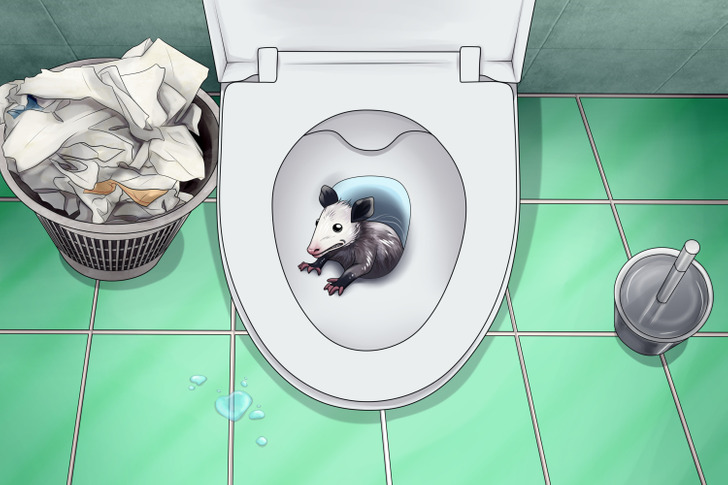
In 2008, a man was in his bathroom in Australia when he saw the water in the toilet gurgling. Moments later, a baby possum appeared and this is not the first time this has happened. On another occasion, a woman found a dead possum in her toilet. These unusual guests are excellent swimmers and can hold their breath for a long time — that’s why they can crawl into your toilet.
How to prevent and react to these occurrences
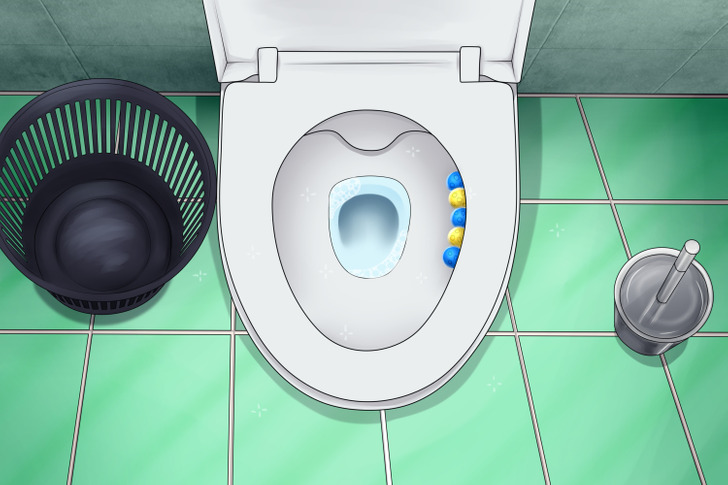
- Keep your toilet clean: This may sound obvious, but you really need to clean your toilet often and neatly. Disinfecting cleaners are perfect for that job and if you want something cheaper you can resort to white wine vinegar or baking soda. You can also get one of those fresheners that stick on the side of the toilet and release a nice smell every time you flush.
- Keep it dry: Most pests love humidity and that’s why they will be attracted to wet bathroom floors. So, it’s important to get rid of any standing water from the sink or the floor after you’ve taken a shower. If you notice any leaks in your plumbing, call a technician immediately and get them fixed.
- Clean your pipes naturally: In a bowl, add equal parts of sugar, water, vinegar, and 5-10 drops of dish soap. Mix all of this together and pour it down the toilet or in your bathroom sink. You can also pour some boiling water into the toilet.
- Call a pest control company: If you don’t have the time or courage to deal with pests yourself, call professionals and let them use their heavy cleaners. After that is done, you can occasionally throw water mixed with a cleaning solution down the drain to make sure no pest will climb up into the toilet.
Have you ever found an uninvited guest in your toilet — if so, what was it and how did you react?
Kylie Jenner Is Criticized for Piercing Her Daughter’s Ears
Piercing a baby’s ears has always sparked debate, with people divided on its safety and ethics. While some see it as a harmless tradition or a personal choice, others worry about consent, health risks, and the child’s autonomy. The controversy flared up when celebrity influencer Kylie Jenner posted a photo of her daughter, Stormi Webster, with pierced ears. This picture led to widespread discussion and criticism, once again bringing attention to the ongoing debate about piercing babies’ ears.

Lots of babies around the world get their ears pierced, but it’s the earlobes of famous babies that get people talking online about whether it’s safe for little ones to wear jewelry. When her daughter Stormi Webster was five months old, Kylie shared a picture of her lying on a bed in a softly lit pink room. Followers noticed the tiny studs in Stormi’s ears, which were barely visible but still caught their attention.

Jenner is used to social media controversies, but the criticism about her young daughter and parenting skills is particularly harsh this time. Some strongly argue against piercing a baby’s ears, while others call Jenner “cruel” and “thoughtless.” “Is she going to start putting big earrings in her [ears] now [they’re] pierced? A [baby’s] ear is still forming and growing at that age,” one user wrote. “Piercing a babies ears!!!! @kyliejenner be ashamed of yourself. This is utterly disgraceful,” another follower commented.

Although getting a baby’s ears pierced is usually seen as safe, doctors warn about the risk of infections. Some suggest waiting until your baby is around 4 months old. However, the American Academy of Pediatrics doesn’t have a clear rule on when it’s best to pierce ears. They recommend waiting until a child can take care of the piercing themselves, but they don’t say no to piercing babies.

Kylie Jenner and her former partner Travis Scott gained notice for their unique parenting style. Travis revealed that they give their toddler Stormi a lot of independence. He mentioned they let Stormi choose her bedtime, deciding whether she wants to sleep at the usual time or stay up later. Stormi consistently chooses bedtime, which surprises many parents who appreciate her commitment to a good sleep routine.
Some parents think piercing their baby’s ears heals faster when they’re young. Others believe it’s important to respect their child’s autonomy and find piercing without consent unethical. Although tiny earrings might look cute, they can be dangerous for babies, causing injuries during play or even choking hazards.
Preview photo credit kyliejenner / Instagram



Leave a Reply